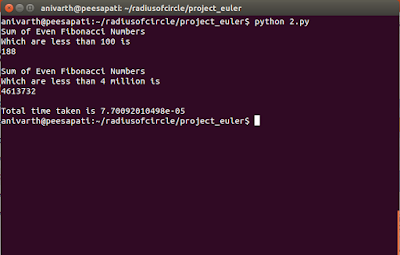Even fibonacci numbers
Each new term in the Fibonacci sequence is generated by adding the
previous two terms. By starting with 1 and 2, the first 10 terms will
be:
If you have seen the code we have written two programs even if we wanted only one solution. The first program corresponds to the solution for the example problem given in the question and the second program refers to the problem for which we will have to find the solution. I have neatly commented the code and I think it is pretty easy to understand.
If you want to download code, you can get it from github - pep2.py
I have made every effort to write this program so that it will execute in a short time and also keeping in mind, people who are new to programming. I think every part in this post is easy to understand. But if you have any doubt or didn't understand anything then please do comment in the comment box below. I will be glad to help you. You can also contact me if you want to.
Please don't hesitate to comment or contact me if you want me to add any part or if I have made any typo in this post.
Thank you. Have good luck. 😀
See Problem 1 Project Euler with Python
1, 2, 3, 5, 8, 13, 21, 34, 55, 89, ...
By considering the terms in the Fibonacci sequence whose values do
not exceed four million, find the sum of the even-valued terms.If you have seen the code we have written two programs even if we wanted only one solution. The first program corresponds to the solution for the example problem given in the question and the second program refers to the problem for which we will have to find the solution. I have neatly commented the code and I think it is pretty easy to understand.
If you want to download code, you can get it from github - pep2.py
Output
I have made every effort to write this program so that it will execute in a short time and also keeping in mind, people who are new to programming. I think every part in this post is easy to understand. But if you have any doubt or didn't understand anything then please do comment in the comment box below. I will be glad to help you. You can also contact me if you want to.
Please don't hesitate to comment or contact me if you want me to add any part or if I have made any typo in this post.
Thank you. Have good luck. 😀
See Problem 1 Project Euler with Python

